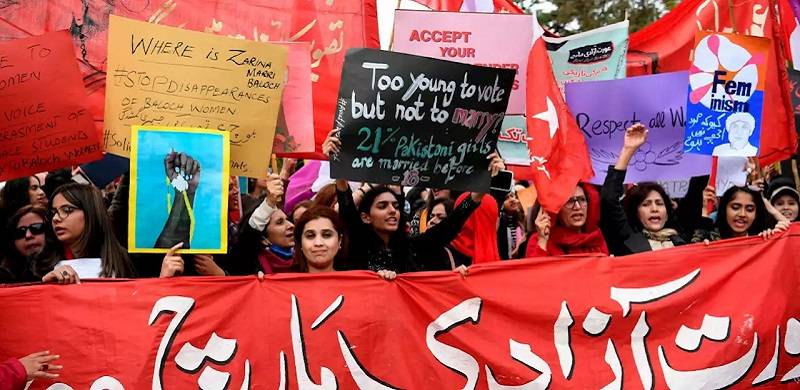
Aurat March Lahore has released the manifesto for this year's march titled 'Reimagining Justice' or 'Asal Insaaf', calling for a structural revision of the state and society's conception of justice.
The manifesto aims to resolve systemic inadequacies as perceived by the Lahore chapter of the March. Pointing out that Pakistan has the highest death row population in the world, the manifesto cites an excessive focus on carceral punishment to combat crime, and says the judicial system is discriminatory towards gender and ethnic minorities. Furthermore, the manifesto highlights the economic and environmental disparities which impact vulnerable groups.
Aurat March Lahore proposed a charter of 17 demands, ranging from more funding to 'survivor-centric' welfare organizations, and universal basic income and care work income for all, to the decriminalisation of defamation laws, and an end to 'Safe City' projects.
The demands are borne of research carried out by organizers, as well as discussions with families of victims of enforced disappearances, domestic workers, victims/survivors of sexual violence and religious minorities, in an attempt to make the document inclusive.
Since its inception, Aurat March has aspired to bring to light the myriad of injustices and inequalities faced by Pakistani women. It has come under criticism from religious groups in the country, who claim the movement offends Islamic principles; two years ago, the march in Islamabad turned violent after a group of men pelted female protestors with stones.
Earlier this week, Minister for Religious Affairs and Interfaith Harmony Noorul Haq Qadri wrote a letter to Prime Minister Imran Khan asking him to stop this year's march as he claimed it ‘ridicules, diminishes or minimizes Islamic laws, social mores, decency, or purdah or hijab.’
This year's Aurat March is scheduled to be held on March 8 in cities and towns across Pakistan.
The manifesto aims to resolve systemic inadequacies as perceived by the Lahore chapter of the March. Pointing out that Pakistan has the highest death row population in the world, the manifesto cites an excessive focus on carceral punishment to combat crime, and says the judicial system is discriminatory towards gender and ethnic minorities. Furthermore, the manifesto highlights the economic and environmental disparities which impact vulnerable groups.
Aurat March Lahore proposed a charter of 17 demands, ranging from more funding to 'survivor-centric' welfare organizations, and universal basic income and care work income for all, to the decriminalisation of defamation laws, and an end to 'Safe City' projects.
The demands are borne of research carried out by organizers, as well as discussions with families of victims of enforced disappearances, domestic workers, victims/survivors of sexual violence and religious minorities, in an attempt to make the document inclusive.
Since its inception, Aurat March has aspired to bring to light the myriad of injustices and inequalities faced by Pakistani women. It has come under criticism from religious groups in the country, who claim the movement offends Islamic principles; two years ago, the march in Islamabad turned violent after a group of men pelted female protestors with stones.
Earlier this week, Minister for Religious Affairs and Interfaith Harmony Noorul Haq Qadri wrote a letter to Prime Minister Imran Khan asking him to stop this year's march as he claimed it ‘ridicules, diminishes or minimizes Islamic laws, social mores, decency, or purdah or hijab.’
This year's Aurat March is scheduled to be held on March 8 in cities and towns across Pakistan.

